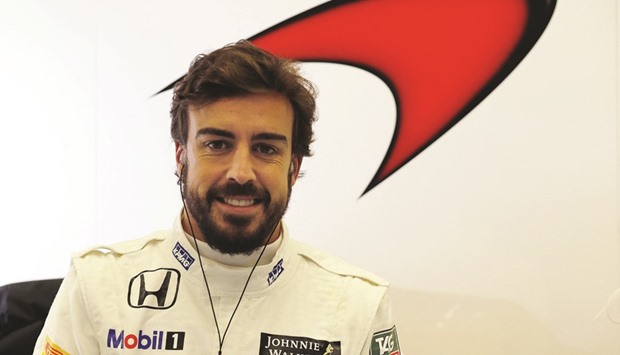McLaren’s Fernando Alonso will use a spare chassis and new power unit to compete in Sunday’s Bahrain Grand Prix, after a crash in Formula One’s Australian season-opener wrecked his car.
Alonso was fortunate to escape serious injury in Melbourne after colliding with the Haas of Mexican Esteban Gutierrez in an accident that halted the race.
A three times winner in Bahrain, but unlikely to be chasing much more than a top 10 finish this time as McLaren battle back from a dismal 2015 season, the Spanish driver said the team and Honda had made a “massive effort” after the crash.
“We’re still pushing to bring upgrades to each race, so providing we can get everything to the car in time we’ll be aiming to get as much track time as possible with the new chassis from the start of free practice,” he said yetserday.
Honda’s F1 head Yusuke Hasegawa said the power unit had been recovered but initial investigations showed the engine and surrounding parts were too badly damaged to be salvaged.
“We will be replacing the complete power unit in Bahrain,” he said.
Drivers are allowed five power units to last the complete 21 race season, with penalties if they exceed the allocation.
Bahrain qualifying will be another fail, says Wolff
Formula One’s much-derided new qualifying format faces more criticism in Bahrain this weekend after a disappointing debut in Australia, Mercedes motorsport director Toto Wolff said yesterday.
The Austrian warned also that the sport was ‘under scrutiny’ and needed to think carefully to extricate itself from a self-imposed problem.
“This weekend we will see the new qualifying system continue after a less-than-impressive debut in Australia,” Wolff said in a team preview for Sunday’s second race of the season at the Sakhir circuit.
“The teams were unanimous in their opinion of it on Sunday in Melbourne and it wasn’t a positive opinion. We haven’t found the right format with this change and it’s hard to see how it might be more entertaining for the fans this weekend in Bahrain.”
Teams had agreed unanimously only weeks before the season started to change the qualifying format to create more excitement in the Saturday session, introducing instant elimination of the slowest drivers at timed intervals.
While the first and second phases of qualifying saw more action, the final eight car session proved a flop with drivers watching from the garages as the clock ticked away the closing minutes without anyone on track.
Wolff, whose team qualified first and second with triple champion Lewis Hamilton and Nico Rosberg, had said in Melbourne that the new format was ‘pretty rubbish’ and needed changing.
However, a subsequent meeting of teams and F1 stakeholders failed to find unanimity and decided to leave it in place for at least one more race rather than be rushed into a knee-jerk decision.
“The sport is under scrutiny on this matter, so careful thought is required in order to make coordinated, intelligent steps forward from the position we are in right now,” said Wolff on Tuesday.
“The fans want close racing, in a format they can understand, between the best drivers and cars in the world—in that order. We should be capable of delivering that to the people in the grandstands and watching around the world.”
Hamilton, who finished second to Rosberg in Australia, qualified on pole last year at Sakhir and will be chasing his third successive Bahrain Grand Prix victory on Sunday.

Fernando Alonso
